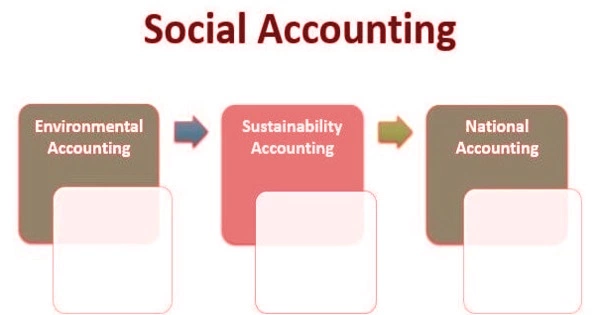Social accounting refers to information about a company’s production, consumption, expenditure, and so on, and how it benefits the overall social environment. It is a method of presenting statistically the interrelationships between the various sectors of the economy in order to gain a thorough understanding of the economy’s economic conditions. To achieve their objectives, all organizations must account for their social costs and benefits.
Example
- Corporate Social Responsibility, such as the building of a hospital in their community.
- The paper manufacturing industry recycles waste paper to make paper.
- Because of the release of toxic air, which is harmful to both living and nonliving things, manufacturing units are located outside of the local area.
- Use proper waste disposal methods to avoid water pollution.
Types of Social Accounting
- Environmental Accounting
It informs about the impact on the natural environment. In other words, it can provide information on how an organization’s activity affects land, soil, climate change, air, water, and the reduction of natural resources such as coal, zinc, gasoline, and natural gas.
- Sustainability Accounting
It is also known as corporate social responsibility and provides information on social and economic sustainability. It has a direct impact on society, the environment, and an organization’s financial performance. Recycling materials, for example, can assist in becoming more sustainable.
- National Accounting
It refers to accounting techniques used to analyze a country’s economic activity. It examines the total expenditure incurred by the country to carry out a business activity. To avoid waste, a government, for example, must track its spending on each project.
Aside from the regular audit, they conduct special audits to determine if there is any waste of funds.
Social accounting generally refers to the social and economic report prepared by a company or organization that works for society to produce goods and services, but the report does not include the profit of the company’s entrepreneur. The report includes social impacts that the company had on society after taking input from the society itself.
Social accounting assesses a company’s environmental and social impact. This method goes beyond traditional financial statement formulation to assess a company’s impact on stakeholders. As a result, social accounting can be used to determine an organization’s accountability. Because their missions are more focused on improving socially and environmentally relevant activities, this approach is an especially useful tool for nonprofits and government entities. The active measurement and application of social accounting allows managers to focus on actions that are particularly important to stakeholders, thereby improving the organization’s long-term acceptance.
















